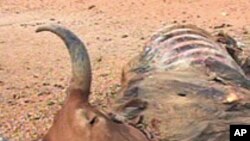The Masaai community in the Kajiado area of southern Kenya is struggling to cope with a drought that is now in its third year. At least half of the area's cows have died, more cases of child malnutrition are surfacing, and attempts to feed the population are meeting with mixed results.
Scenes of devastation in Kajiado show malnourished cows, the mainstay of the Masaai community's economy and diet, due to no water or pasture for cattle to feed on. The Masaai are in big trouble.
Kenny Matampash is executive director of the local aid group Neighbours Initiative Alliance. "In good times, you could sell a cow between 10,000 to 40,000 Kenya shillings. But now, as we talk, you can [sell] a cow at 500 Kenya shillings - 500 Kenyan shillings," he explains.
One hundred eighty six of Matampash's cows have died so far. He describes the effect that has had on his family. "I have four children in school and I have also 21 dependents from my brothers and sisters who are depending on me," he says, "I have even other extended families. Every evening, as we talk, there are always people at my door asking for help, and these are my relatives, people who knew that I herd, and they still expect that I still have."
Families are forced to find alternative means of survival, such as the selling and burning of charcoal, which degrades the environment, or shaking leaves off of trees to feed to animals instead of their usual pasture. Many Masaai now raise goats, which have withstood the drought better than cows.
Kajiado is one of many areas in Kenya experiencing drought and hunger for a third year in a row.
Among the most vulnerable are children five years old and under.
Fatima Health Centre in Lenkisem village serves about 5,000 people, of which some 150 children are estimated to be severely malnourished.
One such child is 3.5-year-old Siteyia. She is being given the supplement Plumpy Nut to increase the nutrients in her tiny body.
About one-third of Kajiado's more than 550,000 people should be receiving food aid from the World Food Program and the Kenyan government.
But there are challenges with this aid. Food given to vulnerable families often gets diluted because of the Masaai's communal values.
Masaai mother Magdalene Nenayio says, "The officials came and we picked four families that we thought were the most vulnerable. But as the drought continued, the other families became worse. Apart from that, it is unethical for us to eat while the rest are watching. It is a must that I must share with those who do not have food," she said.
And, the grains, cereals and other components of the food ration are widely considered to be alien to the Masaai diet and in some cases are considered to be unpalatable.
The local Neighbours Initiative Alliance has come up with a way around that. Each month, mostly women from some 400 hungry households present a food voucher to selected kiosks to receive about $27 worth of food for the month.
Anna Kukuni is with the Alliance. She says giving people a choice of the food they want empowers them and works well with Masaai culture. "The Masaai community does not share their problems openly," she explains, "Unlike others, they have that social fabric where they protect each other. It is very difficult for you to know who is a poor person. With this voucher scheme, and especially for women, they have the power to go to the shop and say, I have this money, this is what I want for my family."
She says they are aiming to increase the number of households receiving the vouchers to 1,200 with the support of the Irish aid group Concern.
Neighbours Initiative Alliance's Kenny Matampash urges donors and communities to look at the long-term development needs of Kajiado. "Food aid should be very, very careful to avoid building the dependency syndrome among communities, and they [aid workers] can come in during good times and go and give non-food intervention projects that can help people to gain the power, to be able to control, to be able to sustain their livelihoods," he said.
In the meanwhile, Kajiado's people are doing the best they can in a dry and harsh world.




